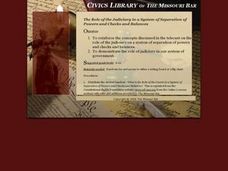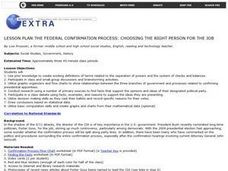American Bar Association
What Is Separation of Powers?
Who has the power? Scholars investigate the creation of the three branches of government in the United States Constitution. They analyze just why the framers created the branches the way they did.
Judicial Learning Center
Judicial Independence: What’s Wrong with This Court?
Why is it important for judges to operate independently of politics or other branches of government? Scholars ponder the question as they examine video clips, case studies, excerpts of the US Constitution, and an interactive computer...
Curated OER
The Beginnings of Constitutional Government
Students examine excerpts of Thomas Paine's Common Sense. For this early American history lesson, students read Paine's pamphlet and analyze the information according the rubric provided.
Curated OER
Civics: State Vs. Rowe
Students examine the case of State vs. Rowe to discover the duties of the three branches of government. They explore the concepts of separation of powers and checks and balances to assess how they apply to an actual situation.
James Madison Memorial Fellowship Foundation
A Picture is Worth a Thousand Words
This exercise on the Constitution requires small groups to design a visual metaphor that expresses the concept behind one of seven principles: popular sovereignty, federalism, republicanism, separation of powers, checks and balances,...
Curated OER
Claim Your Power
Fourth graders analyze the branches of the Texas government and identify its powers and characteristics. The separation of powers and checks and balances are identified.
Curated OER
Powers of Government
Students explore and identify the power of national and state governments. They discuss the concept of federalism and the distribution of governmental powers. As a class, they examine the balance of power between the federal and state...
Curated OER
What Is the Role of the President in the American Constitutional Government?
Students read about the role of the president. In this US government lesson, students read about the role of the president as stated in the US Constitution. Students examine issues of presidential power and identify various checks and...
Judicial Learning Center
The Ratification Debate
Most Americans profess their love for the US Constitution, but this was not always the case. An informative lesson overviews the debate between the Federalists and Anti-Federalists by summarizing the main arguments of each side. It...
Judicial Learning Center
The Power of Judicial Review
Marbury v. Madison is arguably the most important landmark case in the history of the Supreme Court. A fact-filled lesson provides background information about the case and two others related to the concept of judicial review. Scholars...
Heritage Foundation
How to Read the Constitution
Even lawyers can find the US Constitution to be very wordy! Help learners create a foundation for understanding the Constitution with several analysis essays. Multiple activities complement the reading and allow for active and meaningful...
Curated OER
Government: Missouri Bar Civics Library
Students visit the Missouri bar Website to examine information about the U.S. Constitution and its Amendments. They complete a variety of activities from the provided lessons including the judiciary, Fourth Amendment issues, civil law,...
Curated OER
4-H Citizenship Activity Page
In order to understand how our government works, students need to delve into the intricacies at both the local and federal level. Using this 20 question activity learners explore how government affects their daily life.
Curated OER
A More Perfect Union
Fourth graders complete a unit of lessons on the development of the U.S. government. They examine the main ideas of the Declaration of Independence, develop a class translation of the preamble to the Constitution, create a flow chart,...
Curated OER
Teaching Six Big Ideas in the Constitution
Students debate the constitutional principles of the United States. In this U.S. government lesson, students examine the meaning of the text of the U.S. Constitution and analyze other primary documents of the era. Students prepare for...
Curated OER
Why Do We Separate Power?
Students investigate the separation of powers that are outlined in the Constitution. The lesson includes essential questions that are used to guide the research. The information is used to increase knowledge of how power is used in...
Curated OER
Separation of Powers Between the Three Branches of
Students investigate the concept of the three branches of government by dividing into three teams. They record the powers of the three branches.
National Constitution Center
Separation of Powers
Learners explore how the Constitution provides for separation of power and limited government, as evidenced by the three branches of government. They participate in role-playing situations, group discussions, and complete worksheets to...
Curated OER
THE FEDERAL CONFIRMATION PROCESS: CHOOSING THE RIGHT PERSON FOR THE JOB
Students analyze the process whereby presidential appointees are confirmed.
Curated OER
POWERS OF THE PRESIDENT: THE CASE OF LATVIA
Pupils compare the powers of a U.S. president to those of leaders of other countries. They pretend they are presidential advisors and make decisions as a group as to what the president has the right do in different situations.
Curated OER
Government for the People
Seventh graders read about the three branches, the balance of power an the system of checks and balances. They analyze current events in terms of which vranch of government is responsible for addressing issues. Students create a poster...
Curated OER
Separation of Powers: Connecting the Separate Powers
Students study the concept of separation of powers. They recognize how the Constitution provides for separation of powers and categorize public officials into one of three branches of government. Students do a role play and see if...
Constitutional Rights Foundation
How the First State Constitutions Helped Build the U.S. Constitution
Did you know that the United States Constitution was adopted after many state constitutions were already in place? Young scholars examine facts about the influence of states through an informative and interesting resource. Groups then...
Curated OER
Checks and Balances: Japanese-American Incarceration
Students examine the three branches of the Federal Government and their decision to place Japanese-Americans in camps during World War II. They analyze debates made by leaders during this time period.

























